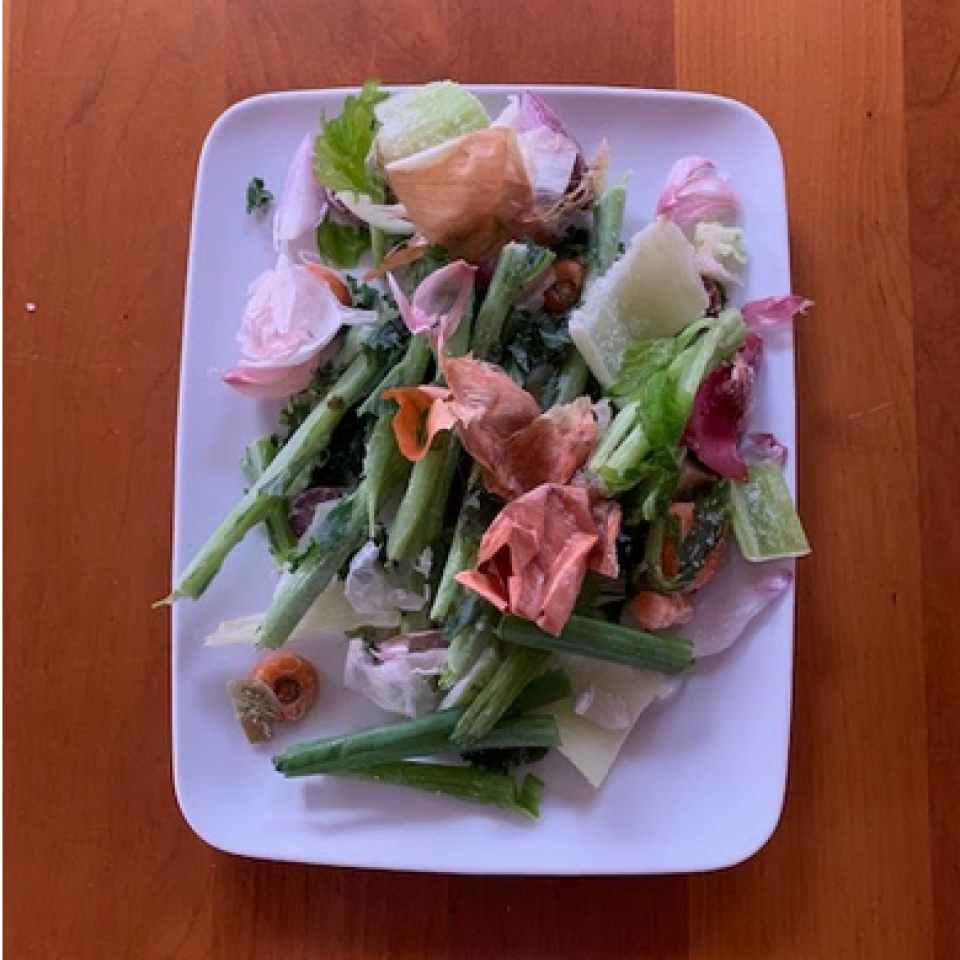Saving Scraps for Vegetable Stock Lesson
Summary
No matter the season, vegetable stock is a staple for many cooking projects and is also a great way to reduce food waste. In this lesson, you will learn how to make stock from kitchen scraps, reflect on food waste, then make some delicious spring and summer soup recipes.
Materials
- Stock Recipe Visual
- Organic (preferred) vegetables scraps
- Spring and Summer Soup Recipes.
Vocabulary
- Food Waste: the food we distribute that never reaches a destination or sits on grocery store shelves without finding a consumer. And it’s food consumers buy but never eat
- Organic: food grown or made without the use of synthetic chemicals or genetically engineered seeds
- Stock, sometimes called broth, is a savory cooking liquid that forms the basis of many dishes, particularly soups, stews and sauces. Making stock involves simmering animal bones or meat, seafood, or vegetables in water or wine, often for an extended period of time
READ
Have you heard the term food waste before? Food Waste is the food we grow that never gets eaten. A lot of food is left unharvested or tilled into the earth. Some is harvested and then rejected at packing plants. Food that expires on grocery store shelves is thrown away. Finally, food is wasted at home too!
Did You Know?
- The average American wastes 20 pounds of food a month.
- Globally about one-third of the food produced never gets eaten, and this translates to about 1.3 billion tons, over 140 million garbage trucks full of wasted food per year.
- In the United States, about 40 percent of the food is wasted!
- Most food waste in the United States happens in homes or at restaurants, where food is thrown away because it spoils before it can be used, because it is left uneaten on a plate, or because too much food is made and not eaten.
- According to the U.S. Department of Agriculture, on average an American family of four throws out about $1,500 worth of food in a year. (Cal. Academy, n.d)
- Approximately $1 trillion of food is lost or wasted every year — accounting for roughly one-third of the world's food. ... Food and Agriculture Organization (FAO), reversing this trend would preserve enough food to feed 2 billion people.
Write
Answer questions and reflections about food waste.
- Write three things you found interesting about facts from the Did You Know? facts
- Write down your answers to these two questions about your own food waste:
- Have you ever thrown away a whole piece of food? For example, a piece of fruit.
- What were some of the reasons you threw that food away?
- Write down one question you have.
Make
Try your hand at making this recipe for a stock made from organic vegetable scraps that would have otherwise gone in the compost. For this recipe, use our Stock Recipe Visual. We recommend gathering vegetable scraps (i.e., onions, garlic, green ends, carrot tops) throughout a couple of days or a week. Keep the vegetable scraps in the freezer and then make a big batch of stock! Get your family involved, ask a parent or guardian to help you!

Figure 1: These are all the food scraps saved from one meal!
Student Notes
- Now that you have your stock, try making one of Edible Schoolyard Staff’s favorite Spring and Summer Soup Recipes.
- Curious about food waste? Want to learn more? Check out this great video about food waste.
References:
- California Academy of Sciences. (2016, Jan. 11). Reducing Food Waste - Save Food to Save the Planet | California Academy of Sciences. YouTube [Video]. Retrieved from https://youtu.be/UgAVtDlaY-k
- California Academy of Sciences. (n.d). Food Waste Audit. Retereived from https://www.calacademy.org/educators/lesson-plans/food-waste-audit
- California Academy of Sciences. (n.d). Our Hungry Planet Supplementary Materials Reducing Food Waste. Retrieved from https://www.calacademy.org/sites/default/files/assets/docs/pdf/flipside_foodwaste_solnssupplement.pdf
- Food Waste Definition (n.d). Public Broadcast Service. Retrieved from https://www.pbs.org/food/features/lexicon-of-sustainability-food-waste/
- Hunger and Waste. (n.d). World Food Program USA. Retrieved from https://www.wfpusa.org/hunger-and-food-waste/
- Project Green Challenge. (2019). Day 13, Food Waste. Retrieved from https://projectgreenchallenge.com/2019-day-13-food-waste/
Disclaimer: all videos and references are used for educational purposes only. The Edible Schoolyard Project does not endorse any brands, labels, organizations, or businesses included in videos or references.
Notes for Parents and Teachers
- This activity supports students in practicing creating: undertaking projects that have tangible results both in the kitchen and garden. And learning, content-rich learning experiences for students around gardening and cooking.
- This activity encourages students to feel that cooking and gardening are more accessible.
- This activity supports students to learn hard skills in growing and preparing food like knife technique, building a well-balanced compost pile, etc.
- This lesson emphasizes NGSS.K.2.ETS1.1 and other science concepts.
- This lesson is adapted from our Autumn Harvest Soup Lesson. The Teacher Notes section of that lesson is especially rich with ways to extend the lesson.
- Want more resources on teaching about food waste? Try our lesson on Food Waste. Also, see our student notes and reference sections for lesson extensions and links.
Authored by Raquel Vigil




